Please Take Note: This is a review of the final game, but it might change slightly based on the success of the Kickstarter campaign. The game is being reviewed on the components and the rules provided with the understanding that “what you see is not what you might get” when the game is published. If you like what you read and want to learn more, we encourage you to visit the game’s web page or visit the Kickstarter campaign. Now that we have all that disclaimer junk out of the way, on with the review.
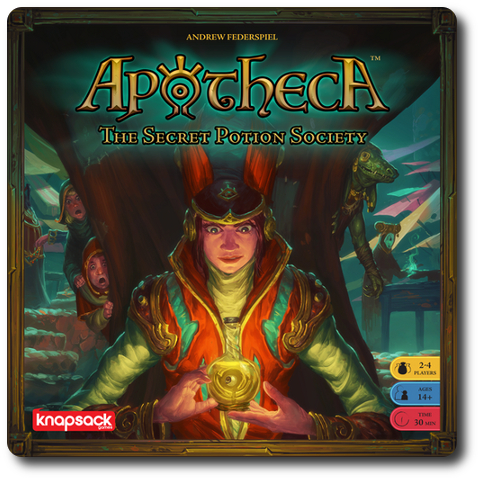
The Basics:
- For ages 7 and up (publisher suggests 14+)
- For 2 to 4 players
- Approximately 30 minutes to complete
Geek Skills:
- Counting & Math
- Logical & Critical Decision Making
- Reading & Writing
- Pattern/Color Matching
- Strategy & Tactics
- Visuospatial Skills
- Cooperative & Team Play
- Hand/Resource Management
Learning Curve:
- Child – Easy
- Adult – Easy
Theme & Narrative:
- To gain entry into a secret society, you have to mix it up a bit
Endorsements:
- Gamer Geek approved!
- Parent Geek approved!
- Child Geek approved!
Overview
Rumors abound of a secret society of apothecaries who know ancient magics and the key to immortality. You have sought this society out and hope to persuade them to allow you to join their ranks. They are amused by your request and will allow you to demonstrate your skills. The first to appease 3 apothecaries will be allowed to join and have access to unlimited power, among other perks, such as discount wagon parking.
Apotheca, designed by Andrew Federspiel, Mark Major, Matthew Austin, and to be published by Knapsack Games, will reportedly be comprised of 1 Market game board, 15 Apothecary cards, 4 Player Reference cards, 42 Potion cards (14 red, 14 blue, and 14 gold), and 42 Gems (14 Red Rubies, 14 Blue Sapphires, and 14 Gold Topazes). As this is a review of a prepublished game, I will not comment on the game component quality. The artwork by Eduardo Garcia is simply excellent, capturing the game’s theme and furthering the narrative with images that suggest old magic, fantastic mysteries, and hidden secrets.
Preparing to Go to Market
Note: The following game set up is for a 2 and 3-player game. For additional instructions for a 4-player game, see “Game Variant” later in this review.
To set up the game, first unfold the Market game board and place it in the middle of the playing area. In total, there are 16 spaces on the game board forming a grid. Each space will hold 1 Potion card.
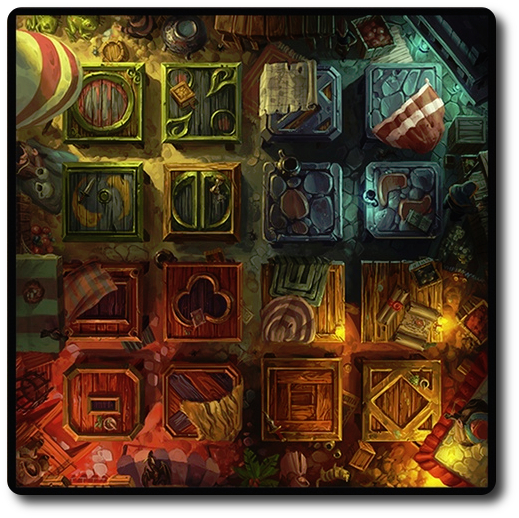
Second, shuffle the Potion cards and deal 4, face-down, on the Market board from one corner to its diagonal corner. When done, it will look as if the Potion cards have cut the Market board in half diagonally. Flip one of the Potions cards in the corners face-up. Rotate the face-down Potion cards so the arrow on the card’s back is not pointing towards any player.
Third, deal 1 Potion card to each remaining corner, face-up. Each corner of the Market board should now have a Potion card (3 face-up and 1 face-down).
Fourth, place the remaining Potion cards face-down to one side of the game playing area. This is the Potion draw deck for the duration of the game.
Fifth, shuffle the Apothecary cards and deal 1 to each player, face-up. This is the players initial Apothecary, but they will collect more. It’s suggested that “Cantrip Flip”, “Teleportal”, “Wandering Waltz”, “Gully Glide”, “Owl Swoop”, and “Sorceress Spin” Apothecary cards be shuffled and placed on top of the Apothecary deck for new players. These Apothecary cards are no less powerful than the others, but are easier to use when first learning the subtleties of the game. When done dealing, place the Apothecary deck face-down to one side of the game playing area. This is the Apothecary draw deck for the duration of the game.
Sixth, deal 3 cards from the Apothecary deck and place them face-up in a row. This is area is referred to as the “Apothecary Alley” which resides next to the Apothecary draw deck.
Seventh, collect 1 Red Ruby, 1 Blue Sapphire, and 1 Gold Topaz. Place one above each the 3 face-up Apothecary cards in Apothecary Alley. The Gems above the Apothecary cards will remain in that position for the duration of the game.
Eighth, place the remaining Gems in a pile next to the Potion cards. This is the Gem Pool for the duration of the game.
Ninth, hand out 1 Player Reference card to each player. If playing with 3-players, find the Player Reference card that has the “Extra Turn” noted on its back. Hold this card and give it to the 3rd player before game play begins. The card can be turned in to give the 3rd player an extra action. This is meant to address any imbalance that might occur due to being the last player in a game round, but it can only be used once.
That’s it for game set up. Determine who should go first and begin.
Potions, Puzzles, and Power
Apotheca is played in turns with no set number of turns per game. A player’s turn is comprised of 4 possible options, but only 2 options can be selected per turn. Furthermore, the player cannot select the same option twice. Each option is summarized here.
Option 1: Reveal 1 Potion Card
The Potion cards on the Market game board come into play face-down. The goal of every player is to reveal the Potion cards and make a row or column (depending on the player’s sitting position) of 3 or more Potion cards of the same color. By revealing a Potion card, the player not only learns what colored potion is underneath, but also earns a Gem (a type of currency in the game) that matches the potion’s color.
- Red potion earns 1 “Red Ruby” Gem
- Blue potion earns 1 “Blue Sapphire” Gem
- Gold potions earns 1 “Gold Topaz” Gem

The downside of revealing a Potion card is that the player’s opponents now know the potion color, too. If the player already knew what the potion color was, they might want to consider keeping it hidden and use another action instead.
Option 2: Restock Potions
If there are ever less than 3 face-down Potion cards on the Market game board, the player can draw 1 Potion card, look at it secretly, and then place it face-down on any empty Market space on the Market game board. This is repeated until there are a total of 3 face-down Potion cards on the Market game board. When the Potion card is placed face-down, make certain the arrow on the Potion card’s back is pointing to the player who placed it. This arrow identifies which player can “peek” at the Potion card during the game. Only the player who places a Potion card can peek at it anytime during the game when it’s their turn.
Option 3: Hire an Apothecary
The Apothecary cards serve 2 purposes. First, they are used to win the game. Second, they give the player access to special abilities that can be used to manipulate cards and gather information. Every player is randomly dealt 1 Apothecary card at the start of the game. The players have access to this Apothecary right from the start, but they will want to hire more. The player has 2 choices.
The face-up Apothecary cards in Apothecary Alley are available for hire. The cost to hire them is twice the number of Gems that are next to the card. For example, an Apothecary card that has a “Red Ruby” Gem next to it can be collected by the player for 2 “Red Ruby” Gems. If the player has the number and correct color of Gems, they return them to the Gem Pool and place the newly acquired Apothecary card face-up in front of their playing space. Then the player draws the top-most Apothecary card from the Apothecary draw deck, refilling Apothecary Alley
Or the player could attempt a “Wild Hire”, which is a blind buy. After paying 1 “Red Ruby”, 1 “Blue Sapphire”, and 1 “Gold Topaz” to the Gem Pool they take the top-most Apothecary card from the Apothecary draw deck as their own, placing it face-up next to any other Apothecary cards the player already has collected.
Option 4: Invoke Power
Each Apothecary card describes an ability the player can activate. The player announces which Apothecary card they are using and resolves the ability noted on the card. If the use of an Apothecary card was the player’s first action, they can activate one of their other Apothecary cards again for their second action, but it must be a different Apothecary card.
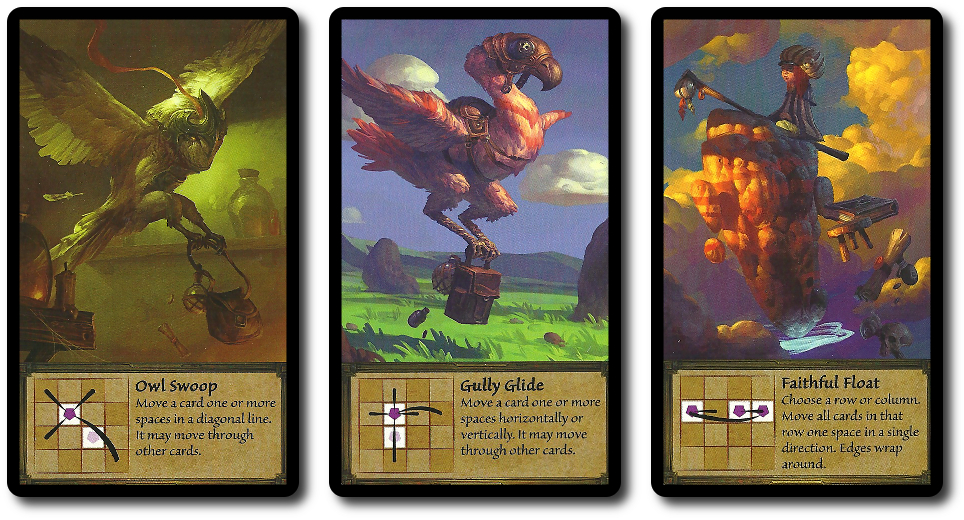
The only other limitation is that a player cannot invoke the power provided by an Apothecary if the results would leave the game unchanged. In other words, the Apothecary power wouldn’t move any Potion cards in the Market.
After completing the actions made available by their 2 selected options, the player’s turn is over. The next player in turn order sequence now takes their turn.
Crashing the Market
The Market game board is meant to represent the potions available to the players. Some are known by all, some are known by a few, and some are a mystery to everyone. If the Market game board is fully stocked with Potion cards (face-up or face-down), draw 1 Potion card and reveal it to all players. All Potion cards that are face-up and match the drawn Potion card color are removed from the Market game board. Take the Potion deck, the removed Potion cards, and the drawn Potion card and shuffle them together. Place the Potion deck face-down and resume the game.
Appeasing Apothecaries
As the game continues, players will begin to move Potion cards around the Market board. If a player is able to match 3 Potion cards of the same color in a row or column (never diagonal), they remove the 3 Potion cards and place them on any active Apothecary card they have. This Apothecary is appeased and satisfied with the player’s ability to mix potions. The selected Apothecary can no longer provide its power to the player, but the player has taken a step towards victory. I suggest you flip the selected Apothecary card over and then place the Potion cards on top. This makes it very easy to see which Apothecary cards are still active and how close to victory the player is.

The player can also attempt to create “special” matches. These are 4-in-a-row, an L-match, a T-match, and a Plus (+) match. The player not only gets to collect the Potion cards and add them to an active Apothecary card, but they also earn 1 Gem that matches the Potion card colors.
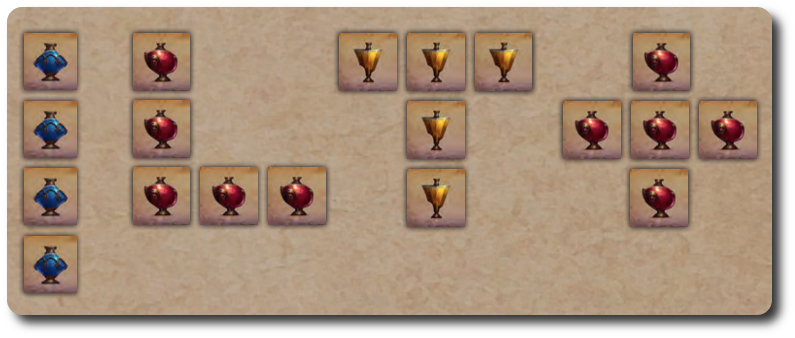
It’s also possible to trigger more than 1 matching row and column that is not connected during the player’s turn. If this occurs, the player decides which matches to collect and resolve first.
If the player makes a match, but does not have any active Apothecary cards, the Potion cards are removed from the Market game board and shuffled back into the Potion deck. Then the player is given 1 Gem that matched the Potion cards color.
The Prize Potion
The game continues until 1 player appeases 3 Apothecary cards. The game immediately ends and the player is declared the winner.
Game Variant
If playing with 4 players, form 2 teams of 2 players each. Alternate the sitting position so that each team member has an opponent to either side of them. The game is set up as normal, but the team members can talk to each about what they know and devise a strategy. Or, the players could decide that talking is not allowed and team members will need to find other ways to communicate.
Team members do not share Gems or peek at another team member’s face-down potions on the Market game board. Nor do they share Apothecary cards. What they do share is victory and they must work together to move Potions cards around to collect as many matches as possible. The first team to appease 3 Apothecaries wins the game.
To learn more about Apotheca, visit the game’s web page or visit the Kickstarter campaign.
Final Word
The Child Geeks were a bit confused at first what this game was all about. They believed they would be mixing potions and creating spells. Apotheca is not that kind of game. They quickly learned that Apotheca was more like a puzzle than anything else. According to one Child Geek, “I didn’t understand why you said this game was going to be tricky to win. I mean, you just flip and move the cards around. Then the other players did the same thing and I was like, oh, yeah, now I see why it’s hard.” But the level of difficulty was never enough to turn the Child Geeks away. They seemed to relish the challenge and took great pleasure in snatching matches away from opponents and chasing after the elusive “special” matches as often as possible. Another Child Geek said, “The game was really easy to learn and so much fun to play. I didn’t care if I won or lost. I just wanted to keep playing.” When all the games were over, the Child Geeks gave Apotheca their full approval, finding the game to be fast, challenging, and a lot of fun.
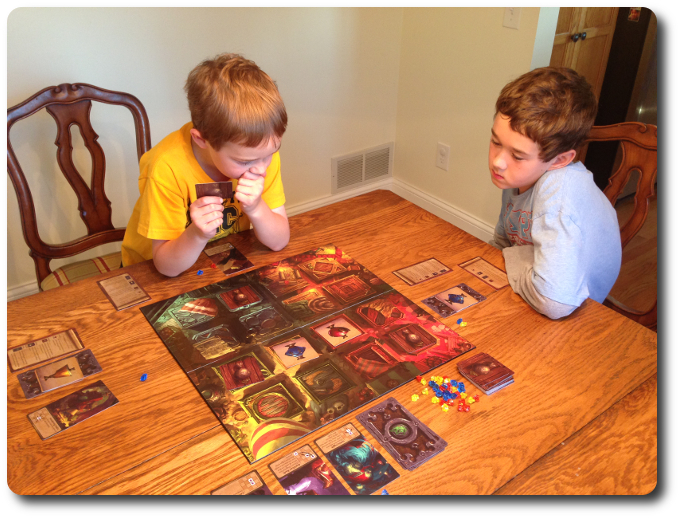
A Child Geek inspects the Market, attempting to determine where best to place the Potion card
The Parent Geeks were also a bit confused at first. They didn’t understand how a game so simple looking could possibly be described by me as a “strategic slide puzzle with variable player powers”. After 5 minutes in the game, they all made that “Oh, now I see” face. According to one Parent Geek, “This is a really enjoyable game. It’s light, it’s casual, and it’s engaging. It’s everything I want to play with family and friends.” Another Parent Geek said, “This game is crazy frustrating at times and remarkably exciting at others. Just when you think you have a match, you get skunked. And just when you think you’ll lose the game, you win!” When all the games were over, the Parent Geeks voted to approve Apotheca, finding it to be fun with family and friends in equal measure. One Parent Geek, wanting the last word, said “This game is a wonderful puzzle. It reminded me of those tile sliding puzzles I enjoyed as a child. This is so much better and so much more fun.”
The Gamer Geeks listened to my brief tutorial (Apotheca is not that complicated of a game) and jumped in. They quickly identified how Apothecary cards could be mixed and matched to create some interesting abilities, how important it was to keep as much information hidden as possible, and how difficult it was to find a clear path to victory. According to one Gamer Geek, “This game is a lot harder than it first appears. With limited turns and resources, every choice you make is very important. I never felt stressed, but I was aware that I didn’t have a lot of room to make mistakes.” Another Gamer Geek said, “The game is about as perfect as you can get. Excellent depth, excellent balance, excellent engagement, and simply…well…excellent. A real tactical and strategic treat.” In fact, all the Gamer Geeks enjoyed themselves. A few were skeptical at first, believing that Apotheca would be little more than just moving cards around a grid, which it actually is, but the level of strategic and tactical game play necessary to win the game was more than they were expecting. This greatly pleased the Gamer Geeks. Pleased them so much, in fact, they all voted to approve Apotheca.
Apotheca is worth getting excited about. It’s one of those games that can be played by anyone and challenges everyone. Child Geeks, Parent Geeks, and Gamer Geeks all sat around the same table, played the same game, and had the same amount of fun. That is rare, indeed.
More to the point, Apotheca is a game that is quickly learned, but so very difficult to master. This gives the game a lot of life on the gaming table. With an average game length of only 30 minutes, Apotheca can be quickly set up and played a number of times in a row without losing the players’ interest. Which is a very good thing when you consider how close the games will be. Not once did any of our games have a runaway leader. It always came down to needing just one more turn to win. Which always left a lot of players disappointed and ready for another chance to obtain victory.
A real surprise was how flexible and important the Apothecary cards were right from the start. A player only has 2 actions per turn and that is really all they will ever need if they have the right Apothecary cards to help do all the heavy lifting. By manipulating the Market game board, an Apothecary card allows the player to move Potion cards into the best position for matches. But there is a wonderfully horrible catch! As powerful as an Apothecary is, the player must sacrifice them in order to win. The player has to strip themselves of power, in other words, in hopes of winning the game. And that, my friends, is a gamble and a hard choice to make. Yes, a player could always enlist another Apothecary, but that takes time and Gems. Two things the player doesn’t have a lot of.
I have played this game way too many times and I’m surprised I’m not sick of it. It keeps me coming back because it’s so ridiculously simple and yet so maddeningly complicated at the same time. After 20 or so games, I have yet to make a “special” match and I have lost to my children more times than my ego would care to admit. But I’ll keep coming back to it because it has the perfect mix of strategy, tactics, and casual game play. I have a difficult time explaining to others what a “good game” is, seeing that such a statement is highly subjective, but I wouldn’t hesitate to mention Apotheca as a an excellent example. If this game sounds interesting to you, I encourage you to go give it a try the very first chance you get.
I’m big on games, but I always stop short of gushing over them whenever I can.
This is a paid for review of the game’s final prototype. Although our time and focus was financially compensated, our words are our own. We’d need at least 10 million dollars before we started saying what other people wanted. Such is the statuesque and legendary integrity of Father Geek which cannot be bought except by those who own their own private islands and small countries.



